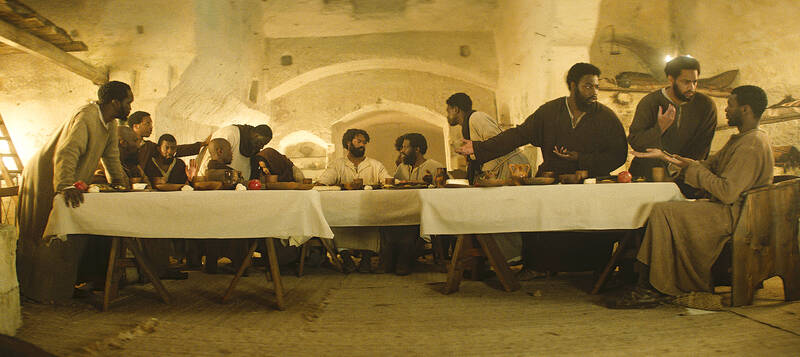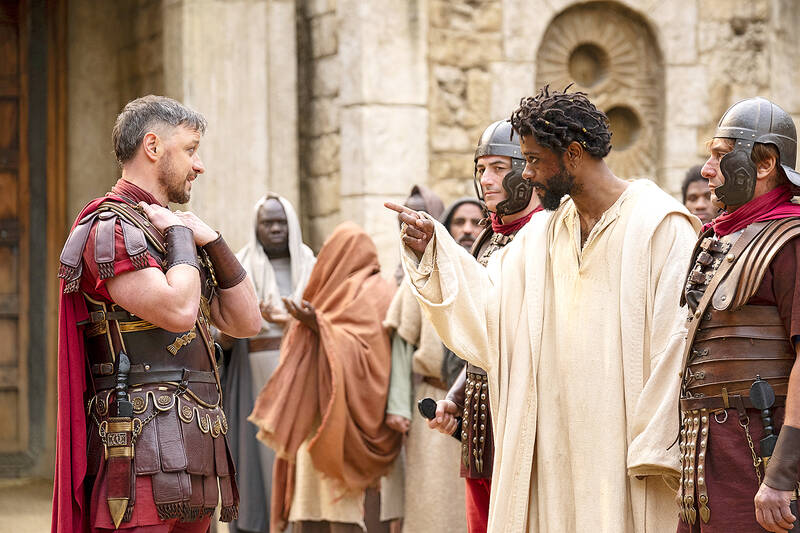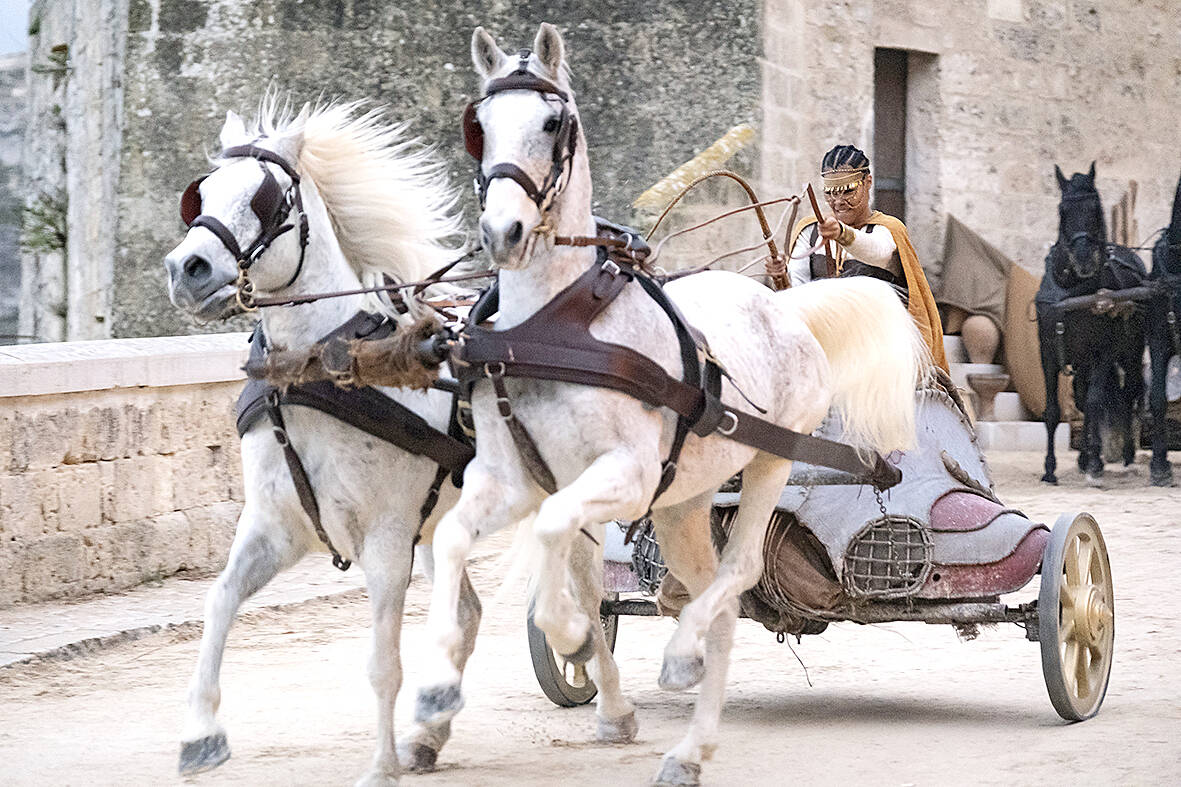Somewhere between the sacred and profane, comedy, drama and satire comes The Book of Clarence, a retelling of The Greatest Story Ever Told that arrives in theaters appropriately between Christmas and Easter.
It’s a remarkably idiosyncratic approach by rising auteur Jeymes Samuel, who for this Biblical-era tale is director, producer, writer and composer for only his second feature. You have to kind of hand it to him: Who else would have the audacity to tackle Jesus in your second outing?
The Book of Clarence — with a stunning cast that includes LaKeith Stanfield, James McAvoy, Anna Diop, Benedict Cumberbatch, Alfre Woodard and David Oyelowo — careens through tones and sentiment, silly in one and then horrific in another. Samuel says he wants viewers to have a “wicked good time” but really it’s a bit of a muddled, unholy mess.

Photo: AP
It is 33 AD in Jerusalem and Stanfield plays Clarence, a street hustler in robes who likes getting high — in one cool, surreal scene he floats into the air like a balloon — and dreams up schemes to get rich quick. He’s got the hots for a local beauty but owes a ton of coins to that beauty’s loansharking brother.
Clarence is called the “village’s mischief maker” and even his mother thinks he needs to get his act together.
“I’m not a nobody,” he tells his twin brother, Thomas (also Stanfield, naturally). “A man who lacks honor is a nobody,” his brother replies.

Photo: AP
We know things are going to end painfully for Clarence because one of the first images in the movie is of him on a cross.
Clarence doesn’t believe in God and certainly doesn’t believe that the local guy named Jesus is capable of miracles. It’s a scam to him. He tries to become a 13th apostle to pay off his debts. When that fails he decides to pretend to be a messiah, too, and get paid for so-called tricks.
Samuel, whose previous movie was the all-Black Western The Harder They Fall, has some creative ideas, like using a chariot race to honor both Ben Hur and Fast & Furious, as well as wonderfully capturing the Last Supper like a painting come alive. He apes biblical epics in his title fonts and the opening and closing of the camera’s iris. He mixes stilted language — “I must make haste” — with modern turns (“I’ve got the cobblestones on lock.”) This is the first Biblical epic to uses the term “dumbass.”

Photo: AP
But Samuel never stays with any idea for long and The Book of Clarence lacks cohesion, as well as consistency, even if the acting is superb, especially from a soulful Stanfield. Is Samuel honoring sword-and-sandal epics? Updating them? Mocking them? Looking at the Jesus story through a Black lens is immensely rewarding but the pay-off is poor.
There are plenty of messiahs here — like Spider-Mans in the multiverse — but it is not clear what the filmmaker wants to say with them. A critique of celebrity? A message about entertainment? That faith comes even to those who have none? That we kill all our saviors? It’s not even clear if this is a pro- or anti-religious movie.
Samuel comments powerfully on us today when white Roman police stop-and-frisk Black Jerusalem residents, but then wastes such a great potential vein to mine with a swanky dance party and cool choreographed moves. He makes us shudder as nails are pounded into Clarence’s flesh, yet also includes humor at the crucifixion — from the actual guys doing the dying. He has a scene with brutal rock throwing and yet also a recurring goofy bit about light bulbs appearing over Clarence’s head.
It’s a mind-melting piece of filmmaking, having elements of both Monty Python’s Life of Brian and The Ten Commandments. (Fun fact, the Italian city of Matera stands in for Jerusalem here and was also where The Passion of the Christ was filmed.) Add to that an exciting soundtrack of more than a dozen songs by Samuel (even one with Jay-Z, also a producer on the movie) and The Book of Clarence is worth a look simply for its sheer daring. But we wouldn’t go so far as to say its creator walks on water.

The Democratic Progressive Party (DPP), Chinese Nationalist Party (KMT), and the country’s other political groups dare not offend religious groups, says Chen Lih-ming (陳立民), founder of the Taiwan Anti-Religion Alliance (台灣反宗教者聯盟). “It’s the same in other democracies, of course, but because political struggles in Taiwan are extraordinarily fierce, you’ll see candidates visiting several temples each day ahead of elections. That adds impetus to religion here,” says the retired college lecturer. In Japan’s most recent election, the Liberal Democratic Party lost many votes because of its ties to the Unification Church (“the Moonies”). Chen contrasts the progress made by anti-religion movements in

Taiwan doesn’t have a lot of railways, but its network has plenty of history. The government-owned entity that last year became the Taiwan Railway Corp (TRC) has been operating trains since 1891. During the 1895-1945 period of Japanese rule, the colonial government made huge investments in rail infrastructure. The northern port city of Keelung was connected to Kaohsiung in the south. New lines appeared in Pingtung, Yilan and the Hualien-Taitung region. Railway enthusiasts exploring Taiwan will find plenty to amuse themselves. Taipei will soon gain its second rail-themed museum. Elsewhere there’s a number of endearing branch lines and rolling-stock collections, some

This was not supposed to be an election year. The local media is billing it as the “2025 great recall era” (2025大罷免時代) or the “2025 great recall wave” (2025大罷免潮), with many now just shortening it to “great recall.” As of this writing the number of campaigns that have submitted the requisite one percent of eligible voters signatures in legislative districts is 51 — 35 targeting Chinese Nationalist Party (KMT) caucus lawmakers and 16 targeting Democratic Progressive Party (DPP) lawmakers. The pan-green side has more as they started earlier. Many recall campaigns are billing themselves as “Winter Bluebirds” after the “Bluebird Action”

Feb 24 to March 2 It’s said that the entire nation came to a standstill every time The Scholar Swordsman (雲州大儒俠) appeared on television. Children skipped school, farmers left the fields and workers went home to watch their hero Shih Yen-wen (史艷文) rid the world of evil in the 30-minute daily glove puppetry show. Even those who didn’t speak Hoklo (commonly known as Taiwanese) were hooked. Running from March 2, 1970 until the government banned it in 1974, the show made Shih a household name and breathed new life into the faltering traditional puppetry industry. It wasn’t the first